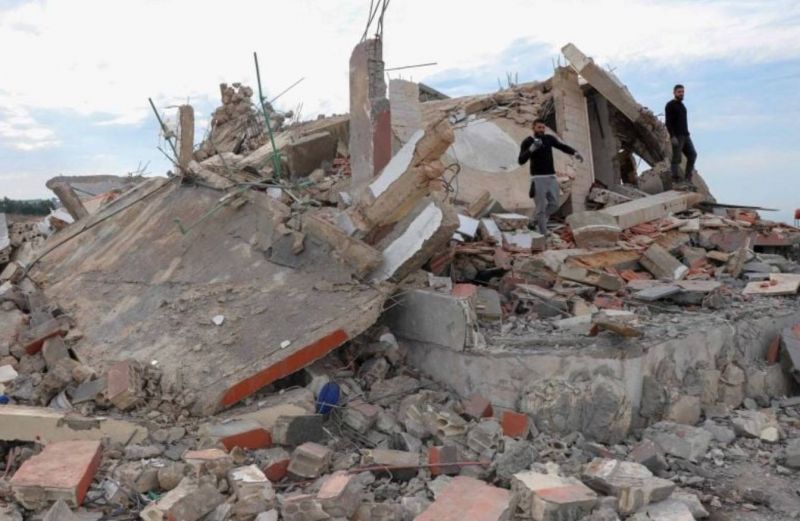
Residents inspect the ruins of a building bombed by Israel in the village of Majdel Zoun in southern Lebanon, Dec. 8, 2023. (Credit: AFP)
The race is on between reaching a broad political settlement and an escalation of clashes. The international community is working around the clock, trying to come up with a diplomatic formula capable of restoring calm to southern Lebanon — which has become a theater of conflict between Israel and Hezbollah since the latter joined the Oct. 7 war alongside Hamas.
Mediation efforts are being led by several political figures, most notably the US, via Biden’s energy security adviser Amos Hochstein. The French are also working hard to influence any agreement that might be reached based on the US proposals, albeit with nuance when it comes to the tone and approach.
French troops in Lebanon?
“The US envoy put forward a resolution to the border dispute between Israel and Lebanon, based in particular on the maritime demarcation agreement between the two countries, which he himself negotiated in October 2022,” said one Western diplomat who requested anonymity.
According to the Americans, this approach would make it possible to dodge further escalation without demanding that a buffer zone be carved out in the south, which would be hard to do.
The French relayed the threats and warnings of both sides. They called for the creation of a safe zone along the border and insisted on the withdrawal of Hezbollah’s elite Radwan force from south of the Litani River. Otherwise, France fears Israel will launch a full-scale war against Hezbollah. The Israelis seemed keen to send this message with intensified military assaults in the past few days.
“Last week Hochstein and Lebanon’s Deputy Parliament Speaker Elias Bou Saab met in Dubai. Following this meeting, the US envoy held a series of contacts with Lebanese players and passed on messages to Parliament Speaker Nabih Berri,” said another Western diplomat, also requesting anonymity. “These efforts are part of the US approach to restore stability to southern Lebanon,” the diplomat added.
Nevertheless, Hezbollah believes that this is naturally linked to the situation in Gaza. “The Americans are aware of that,” said the diplomat. “Hence, any proposal they make will be directly linked to the post-war period in the Palestinian enclave,” they added.
On Monday, Saudi Arabia’s al-Hadath published a proposal that Israel had reportedly passed on to Washington and Paris. The document revealed that Tel Aviv could agree to Hezbollah maintaining “joint observation posts with the Lebanese army and the French army,” both of which would be deployed in the border area.
The text added that French troops would be deployed on the Lebanese side of the border and US troops on the Israeli side.
The Israeli proposal also holds the condition that south of the Litani River be free of any weapons besides those of the Lebanese Army. Neither Washington nor Paris have commented on this information.
‘Fictional scenarios’
Negotiations continue with the aim of implementing UNSC Resolution 1701, which requires that Hezbollah withdraw north of the Litani River, and could pave the way for the settlement of the land border disputes between the two countries.
“But there are different opinions over the diplomatic approach even within Israel’s war cabinet,” said the diplomat.
According to the diplomat, Defense Minister Yoav Gallant and Benny Gantz, who serves as a minister without a portfolio, are working in coordination with the Americans, and support such proposals that could lead to agreement with Hezbollah.
Their approach, however, is different from that of Prime Minister Benjamin Netanyahu, who opts for the military option.
“There are similar differences in the US administration,” added the source. “Some encourage Hochstein’s method, which aims to come to an agreement with Hezbollah based on his experience in the maritime border demarcation dossier and the negotiations that preceded [the deal]. Others support the need to maintain escalation, whether in the Gaza Strip, or in Lebanon, even if it would lead to a war.”
Hezbollah continues to oppose receding from southern Lebanon. According to the party, the outcome of the Gaza war will shape the next stage in the region and, consequently, the negotiations over Resolution 1701 cannot be dissociated from that.
It remains to be seen whether a ceasefire will be based on efforts towards a comprehensive solution to the conflict. In the meantime, Hezbollah stands ready for the possibility of an Israeli escalation.
Hezbollah perceives all these information leaks to be “fictional scenarios fabricated by the Israelis.”
“It’s a way for them to reassure their citizens and test our reaction,” said a Hezbollah official, on condition of anonymity.
“There are no negotiations for the moment, and they will only take place after a ceasefire agreement,” added the source. “Moreover, even the Lebanese army’s deployment, reinforced by 5,000 to 10,000 new recruits, as the Lebanese cabinet suggests, in addition to a higher UNIFIL staffing, will not be able to end Hezbollah’s presence in the border area.”
The most that Hezbollah seems prepared to offer in the event of an agreement is to conceal its military presence south of the Litani River, as was the case after the 2006 war. Back then, when UN Resolution 1701 was still in the making, a saying was often repeated in diplomatic circles: “What we don’t see doesn’t exist.”
This article was originally published in French in L'Orient-Le Jour. Translation by Joelle El Khoury.